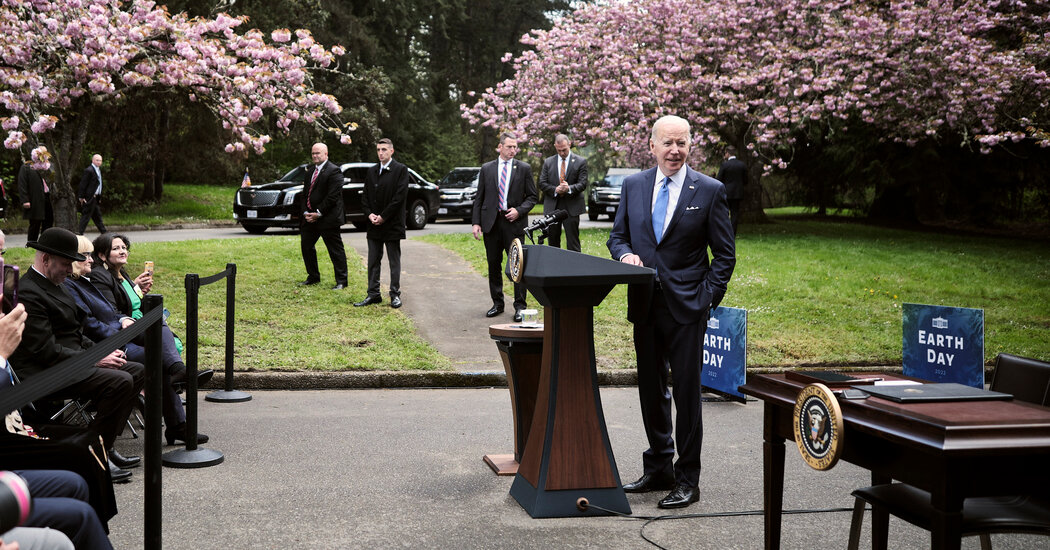
SEATTLE — On a trip to the Pacific Northwest this week, President Biden observed the construction of an earthquake-resistant airport runway that had been paid for with funds from a $1 trillion bipartisan infrastructure law. He unveiled a plan to restore national forests devastated by wildfires. He promoted a climate agenda that has largely gone unfulfilled.
He also said out loud what his advisers have been saying privately for weeks: The immediate demands of the presidency, including the seismic forces of a pandemic and a war in Ukraine, have consumed more of his time than he had anticipated and taken him away from the domestic agenda he wants to sell.
As Mr. Biden’s polling numbers remain dismal ahead of the midterm elections, he appealed to supporters — some with deeper pockets than others — for support.
“We have to keep the United States Senate,” Mr. Biden said on Thursday as he stood in an opulent home overlooking Lake Washington in Seattle. “We can’t afford to lose it. We can’t afford to lose the House.
“What I’m concerned about is that I have been so focused on whatever the immediate emergency is, we haven’t sold the American people what we’ve actually done.”
The trip granted him a bit of a respite from Washington and returned him to the campaign-trail style of schmoozing that energizes him. In Seattle, Mr. Biden appeared before a group of big-ticket donors that included Brad Smith, the president of Microsoft.
At another fund-raiser, held earlier in the day in Portland, Ore., Mr. Biden lamented that two Democrats, Senators Joe Manchin III of West Virginia and Kyrsten Sinema of Arizona, had joined Republicans in holding up much of his hopes for a more expansive social spending bill and other initiatives. Those include the heart of Mr. Biden’s climate policy: a $555 billion plan to pivot the nation to clean energy and electric vehicles, which analysts have said would get the United States about halfway to the White House’s 2030 goal.
“Forty-eight members of the United States Senate have voted with me on 96 percent of the time,” Mr. Biden told a group of donors at a yacht club near the airport in Portland, as a disco ball spun overhead. “Forty-eight. Two have not.”
Mr. Biden told that crowd that he hoped Democrats would pick up two more Senate seats in the midterms and bolster the party’s majority in the chamber. It was unclear which two seats he meant, but they are eyeing races in Pennsylvania, Wisconsin and North Carolina.
The return to domestic matters was a sign of what is to come as the midterm season draws closer.
Russia will remain a priority for the administration, Mr. Biden’s advisers say, but it is one that has to be balanced with meeting the domestic challenges of rising prices and an unpredictable coronavirus pandemic. There is also the broader challenge of illustrating what the administration has done while trying to explain why more has not been accomplished on Mr. Biden’s other promises, which include moving forward on voting rights initiatives, curbing prescription drug prices and combating climate change.
Biden officials say the administration, from the president on down, understands the need to acknowledge the sticker shock the American public is feeling as the conflict in Ukraine continues. The White House wants to send the president into the country to promote his agenda more often as the midterm season begins in earnest — with the worrisome caveat, they say, that the coronavirus and Russia could continue to pull him away.
“Presidents don’t choose the circumstances under which they govern,” the Democratic strategist David Axelrod said in an interview. “You wake up every day with the knowledge that something unwelcome may happen. A lot of these situations are unsatisfying.”
One senior administration official said Mr. Biden would also need to draw more of a contrast with the Republican Party — specifically its leader, former President Donald J. Trump — as he begins traveling the country to solicit donations and assist Democrats in vulnerable districts. Mr. Biden said in three speeches during his trip that the Republican Party had morphed into one focused more on culture wars than what he called “traditional” conservative doctrine.
“There’s nothing conservative about deciding you’re going to throw Disney out of its present posture because, Mickey Mouse? In fact, you think we should not be able to say, you know, ‘gay’?” Mr. Biden said in Seattle, referring to a clash between the theme park and Florida lawmakers over a law that prohibits classroom instruction and discussion of sexual orientation and gender identity in some elementary school grades.
On Friday, he also called the Trump-era Republican lawmaker a “different breed of cat” from those he knew from his time in the Senate, a reference to Republican leaders who privately said Mr. Trump was responsible for inciting the deadly riot on Jan.6, 2021, and vowed to drive him from politics but have publicly sought Mr. Trump’s favor.
“This is a MAGA party now,” Mr. Biden said, referring to Mr. Trump’s campaign slogan.
Before he left the Pacific Northwest, the president also sought to draw attention to a climate agenda that advocates worry has stalled. Mr. Biden came into office with an ambitious climate change agenda to address what he called the “existential threat of our time.”
As demonstrators prepared “Fight for Our Future” rallies across the country pushing the administration and Congress to pass climate legislation, Mr. Biden signed an executive order that he said would strengthen international forest protection commitments the United States made last year at a climate summit in Scotland. He also pledged that all vehicles in the United States would eventually be climate friendly.
The Infrastructure Bill at a Glance
“I think that we’re at one of those moments in world history and American history that we’ve reached the point that the crisis on the environment has become so obvious — with the notable exception of the former president — that we really have an opportunity to do things we couldn’t have done two, five, 10 years ago,” Mr. Biden said amid the cherry blossoms at Seward Park in Seattle on Friday.
Last year, on his first Earth Day in office, Mr. Biden promised that the United States would lead the world in tackling climate change and vowed to cut America’s emissions roughly in half by 2030. Over the past year, his administration has eased the way for solar and offshore wind development; enacted regulations to phase out hydrofluorocarbons, a powerful greenhouse gas commonly found in refrigerants; and restored Obama-era limits on emissions from vehicle tailpipes.
It also has proposed regulations on methane emissions from oil and gas wells and a measure to force companies to disclose their greenhouse gas emissions through the Securities and Exchange Commission. But so far his administration has failed to enact the heart of Mr. Biden’s climate policy — the $555 billion plan around clean energy and electric vehicles.
The measure has been stuck in the Senate because of unified opposition from Republicans as well as Mr. Manchin, a powerful swing vote in the evenly divided chamber.
At the same time, rising gas prices, driven in part by Russia’s invasion of Ukraine, have pushed Mr. Biden to call on oil companies to drill more. And last week the Interior Department opened more public lands to drilling, reversing one of his top environmental campaign promises.
The White House has disputed the idea that it has fallen short or that more demand for oil would be in conflict with the administration’s goals for the environment.
“The president has climate goals, and he wants to continue to fight for climate control,” Karine Jean-Pierre, a White House spokeswoman, told reporters aboard Air Force One on Thursday. “And he has used the power of his office to do that.”
Lisa Friedman contributed reporting from Washington.




